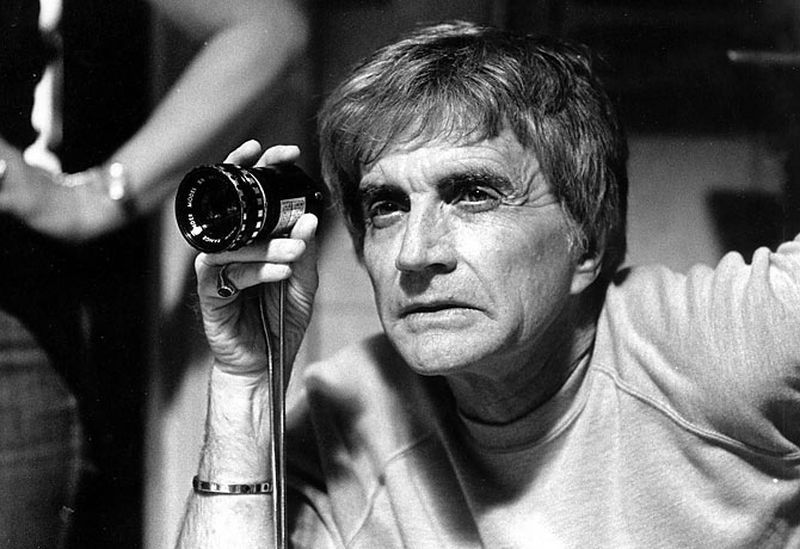Happy Birthday, Blake Edwards!
If I enlisted you into playing a word association game and started the ball rolling by uttering “Blake Edwards”—chances are that you would respond with “Pink Panther”…for it was indeed Edwards who instituted that long-running movie franchise (beginning with 1964’s The Pink Panther) starring British actor-comedian Peter Sellers as the bumbling French Inspector Jacques Clouseau. Edwards’ film career as a movie director includes such classics as Operation Petticoat (1959), Breakfast at Tiffany’s (1961), and Days of Wine and Roses (1962), and on the small screen he was responsible for introducing super-suave Peter Gunn to TV audiences. But I’d bet only a handful know of Blake’s contributions to radio, including a detective that also had a bit of success on the boob tube—Richard Diamond, Private Detective. Seeing that Mr. Edwards was born William Blake Crump on this date in Tulsa, Oklahoma in 1922, it seems only fitting we pay tribute to his career, particularly his work in the aural medium.
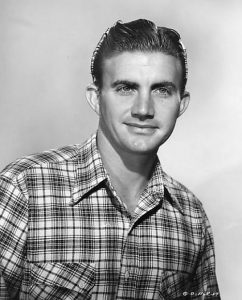 Blake Edwards’ father, Donald Crump, purportedly abandoned the family before Blake was born. His interest in show business might have been cultivated by his stepfather, Jack McEdwards, who moved the family out to L.A. in 1925 to take a job as a film production manager. (He had been a movie director during the silent era.) In a 1971 interview with The Village Voice, Blake observed that relations between him and his stepdad were not particularly rosy (he felt “alienated” and “estranged”), but after attending grammar and high school in Los Angeles, actively sought work as a film actor — beginning with an uncredited bit as a cadet in 1942’s Ten Gentlemen from West Point.
Blake Edwards’ father, Donald Crump, purportedly abandoned the family before Blake was born. His interest in show business might have been cultivated by his stepfather, Jack McEdwards, who moved the family out to L.A. in 1925 to take a job as a film production manager. (He had been a movie director during the silent era.) In a 1971 interview with The Village Voice, Blake observed that relations between him and his stepdad were not particularly rosy (he felt “alienated” and “estranged”), but after attending grammar and high school in Los Angeles, actively sought work as a film actor — beginning with an uncredited bit as a cadet in 1942’s Ten Gentlemen from West Point.
Movies in which Blake Edwards performed bit roles (non-credited) include A Guy Named Joe (1943), Wing and a Prayer (1944), Thirty Seconds Over Tokyo (1944), and They Were Expendable (1945). Blake played a lot of military men in the movies, and life would imitate art during World War II when he served in the United States Coast Guard. (He would suffer a back injury that resulted in years of agonizing discomfort.) As for his film career—well, he worked with a lot of well-known directors, but at that time was acquiring a reputation as (as he put it) “a spunky, smart-assed kid.” “Maybe even then I was indicating that I wanted to give, not take, direction,” he mused. The ambitious Edwards convinced John C. Champion, an individual with whom he had attended high school, to put some money into a Western movie that the two men would write. The finished product was released by Monogram in 1948 as Panhandle. They teamed up for another film as their follow-up (as producers and writers), Stampede (1949), before going their separate ways.
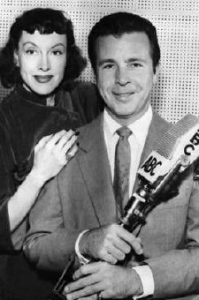 With those writing and producing credits under his belt, Blake Edwards happened to tune into a radio program on which his girlfriend, an aspiring actress, was appearing. When she asked him what he thought, Blake confessed that it was “pretty bad.” Challenged to do better, Edwards worked up his own script (using the girl’s show, Hollywood Star Theatre, as a template) and she submitted it to Star Theatre’s producer, Nat Wolff…who liked Blake’s contribution so much that he passed it off to radio auteur Jack Webb. Wolff would then introduce Edwards to Don Sharp, who was looking for a radio vehicle for his client, Dick Powell. Blake did a little bluffing—telling Sharp he had just the thing for Dick, but…since he was living at the beach…he would have to go home and bring it back the following day. He wrote up a treatment for Richard Diamond, Private Detective that evening, and the show premiered over NBC Radio on April 24, 1949. The program would continue to run (with stops at ABC and CBS) under various sponsorships until September 20, 1953.
With those writing and producing credits under his belt, Blake Edwards happened to tune into a radio program on which his girlfriend, an aspiring actress, was appearing. When she asked him what he thought, Blake confessed that it was “pretty bad.” Challenged to do better, Edwards worked up his own script (using the girl’s show, Hollywood Star Theatre, as a template) and she submitted it to Star Theatre’s producer, Nat Wolff…who liked Blake’s contribution so much that he passed it off to radio auteur Jack Webb. Wolff would then introduce Edwards to Don Sharp, who was looking for a radio vehicle for his client, Dick Powell. Blake did a little bluffing—telling Sharp he had just the thing for Dick, but…since he was living at the beach…he would have to go home and bring it back the following day. He wrote up a treatment for Richard Diamond, Private Detective that evening, and the show premiered over NBC Radio on April 24, 1949. The program would continue to run (with stops at ABC and CBS) under various sponsorships until September 20, 1953.
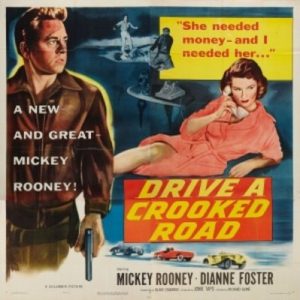 Blake Edwards not only penned the weekly investigations of Richard Diamond…he had a hand in the creation of radio’s The Line-Up, and contributed to both Suspense and Yours Truly, Johnny Dollar as well. Asked by Leonard Maltin in an interview if there was a specific reason why he didn’t continue in radio, Edwards quipped: “Only because I got a better job. You know, somebody called me up and said, ‘You want to write a movie?’ And that was that.” That movie was 1952’s Sound Off, which he co-wrote with director Richard Quine; the duo would also work together on such films as All Ashore (1953), Drive a Crooked Road (1954), and The Atomic Kid (1954).
Blake Edwards not only penned the weekly investigations of Richard Diamond…he had a hand in the creation of radio’s The Line-Up, and contributed to both Suspense and Yours Truly, Johnny Dollar as well. Asked by Leonard Maltin in an interview if there was a specific reason why he didn’t continue in radio, Edwards quipped: “Only because I got a better job. You know, somebody called me up and said, ‘You want to write a movie?’ And that was that.” That movie was 1952’s Sound Off, which he co-wrote with director Richard Quine; the duo would also work together on such films as All Ashore (1953), Drive a Crooked Road (1954), and The Atomic Kid (1954).
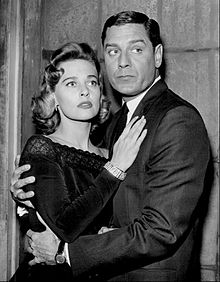 All four of the aforementioned movies starred Mickey Rooney, with whom both Edwards and Quine would work with on a short-lived TV sitcom entitled The Mickey Rooney Show: Hey Mulligan. It was TV that provided Blake with his first opportunity to become a director, helming episodes of his friend Dick Powell’s Four Star Playhouse. Later in the decade, Edwards would create and produce (as well as contribute scripts to) Peter Gunn, a jazzy crime drama that ran for three seasons on NBC and ABC. Blake also produced, for a time, the series Mr. Lucky. Both Gunn and Lucky featured music from Henry Mancini, a composer with whom Edwards enjoyed a fruitful partnership. When Blake’s motion picture directing career was in full swing, Mancini worked with him on the likes of Experiment in Terror (1962) and The Party (1968).
All four of the aforementioned movies starred Mickey Rooney, with whom both Edwards and Quine would work with on a short-lived TV sitcom entitled The Mickey Rooney Show: Hey Mulligan. It was TV that provided Blake with his first opportunity to become a director, helming episodes of his friend Dick Powell’s Four Star Playhouse. Later in the decade, Edwards would create and produce (as well as contribute scripts to) Peter Gunn, a jazzy crime drama that ran for three seasons on NBC and ABC. Blake also produced, for a time, the series Mr. Lucky. Both Gunn and Lucky featured music from Henry Mancini, a composer with whom Edwards enjoyed a fruitful partnership. When Blake’s motion picture directing career was in full swing, Mancini worked with him on the likes of Experiment in Terror (1962) and The Party (1968).
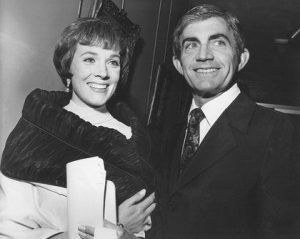 Blake Edwards’ feature film directorial debut was 1955’s Bring Your Smile Along. Although his career included high points (like the previously mentioned Tiffany’s and Wine and Roses), he would become best known for his comedic contributions (like the Pink Panther films), and occasional curios like Darling Lili (1970), The Tamarind Seed (1974), and S.O.B. (1981). All three of the latter films starred Mrs. Edwards — he wed Julie Andrews in 1969 — as did 1982’s Victor/Victoria, which many consider to be one of his finest films. Edwards would continue to direct until 1995 (his last effort was a TV presentation of Victor/Victoria with Andrews, a video recording of the Broadway version he directed), and passed away in 2010 at the age of 88.
Blake Edwards’ feature film directorial debut was 1955’s Bring Your Smile Along. Although his career included high points (like the previously mentioned Tiffany’s and Wine and Roses), he would become best known for his comedic contributions (like the Pink Panther films), and occasional curios like Darling Lili (1970), The Tamarind Seed (1974), and S.O.B. (1981). All three of the latter films starred Mrs. Edwards — he wed Julie Andrews in 1969 — as did 1982’s Victor/Victoria, which many consider to be one of his finest films. Edwards would continue to direct until 1995 (his last effort was a TV presentation of Victor/Victoria with Andrews, a video recording of the Broadway version he directed), and passed away in 2010 at the age of 88.
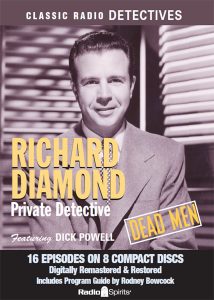 Blake Edwards said of Dick Powell, “…we took a liking to each other, as a matter of fact. He was really a sweet man.” Edwards did admit, however, that when Powell brought Diamond to TV (starring future Fugitive David Janssen) he sort of had to remind him that he did originate the character before Dick finally threw some money his way. On the anniversary of Blake’s birthday, Radio Spirits invites you to check out our Richard Diamond collections of Homicide Made Easy, Mayhem is My Business, and Dead Man (which also features our other birthday celebrant, Stacy Harris—a favorite actor of Blake’s during his stint in radio!). You can also hear Edwards’ work on The Line-Up: Witness and Yours Truly, Johnny Dollar: Mysterious Matters.
Blake Edwards said of Dick Powell, “…we took a liking to each other, as a matter of fact. He was really a sweet man.” Edwards did admit, however, that when Powell brought Diamond to TV (starring future Fugitive David Janssen) he sort of had to remind him that he did originate the character before Dick finally threw some money his way. On the anniversary of Blake’s birthday, Radio Spirits invites you to check out our Richard Diamond collections of Homicide Made Easy, Mayhem is My Business, and Dead Man (which also features our other birthday celebrant, Stacy Harris—a favorite actor of Blake’s during his stint in radio!). You can also hear Edwards’ work on The Line-Up: Witness and Yours Truly, Johnny Dollar: Mysterious Matters.

